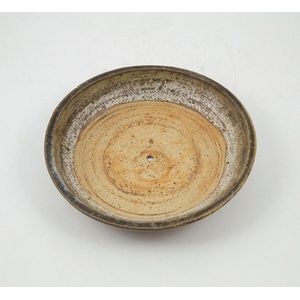18th Century Islamic Magic Bowl from China
You must be a subscriber, and be logged in to view price and dealer details.
Subscribe Now to view actual auction price for this item
When you subscribe, you have the option of setting the currency in which to display prices to $Au, $US, $NZ or Stg.
- Qing Dynasty - The Qing Dynasty was the last imperial dynasty of China, ruling from 1644 to 1912. It was established by the Manchu people, who originated from the northeastern region of China. The Qing Dynasty was preceded by the Ming Dynasty and followed by the Republic of China.
This item has been included into following indexes:
- Chinese ceramics, famille
- Chinese ceramics, famille decoration
- Chinese ceramics, region - Swatow 96
Visually similar items


Len Castle bonsai dish, 1958, 26 cm diameter. Provenance: Ex Rosie's Tea Garden, Auckland

An 18ct rose gold diamond cluster ring, alternate bands of round brilliant cut diamonds (82 total 0.70ct), and 86 tapered baguette cut diamonds (86 total 0.91ct), size N-O.

A Chinese incised & press moulded bowl, made in the tradition of the Ding Kiln during the song dynasty, conical shaped cream glazed bowl is resting on a unglazed foot, diameter 21 cm
